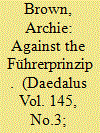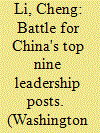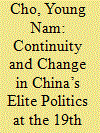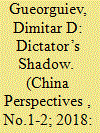| Srl | Item |
| 1 |
ID:
146253


|
|
|
|
|
| Summary/Abstract |
The Führerprinzip has not been confined to Nazi Germany. The cult of the strong leader thrives in many authoritarian regimes and has its echoes even in contemporary democracies. The belief that the more power a president or prime minister wields the more we should be impressed by that politician is a dangerous fallacy. In authoritarian regimes, a more collective leadership is a lesser evil than personal dictatorship. In countries moving from authoritarian rule to democracy, collegial, inclusive, and collective leadership is more conducive to successful transition than great concentration of power in the hands of one individual at the top of the hierarchy. Democracies also benefit from a government led by a team in which there is no obsequiousness or hesitation in contradicting the top leader. Wise decisions are less likely to be forthcoming when one person can predetermine the outcome of a meeting or foreclose the discussion by pulling rank.
|
|
|
|
|
|
|
|
|
|
|
|
|
|
|
|
| 2 |
ID:
112167


|
|
|
| 3 |
ID:
157758


|
|
|
|
|
| Summary/Abstract |
This article analyzes the 19th National Congress of the Chinese Communist
Party (CCP) held in October 2017. It focuses on leadership changes (including
power succession) and revision of the Party Constitution. It tries to answer the
question of whether Xi Jinping’s “one-man rule”, instead of collective leadership,
was established after the Congress. First, it looks at several norms concerning
personnel selection (including the 68 age-limit regulation) that play a critical role
in maintaining collective leadership. Second, it examines to which extent the 19th
Party Congress upheld these norms. Third, this paper investigates the enshrining of
Xi Jinping Thought in the Party Constitution and the implications with regards to
the changes of elite politics. It argues that the Party Congress followed the norms
relatively well, and that collective leadership still persists. In other words, Xi’s
“one-man rule” is not established yet
|
|
|
|
|
|
|
|
|
|
|
|
|
|
|
|
| 4 |
ID:
162084


|
|
|
|
|
| Summary/Abstract |
President Xi Jinping is arguably the most powerful Chinese leader since Chairman Mao. Recent constitutional revisions and a midterm leadership reshuffle has only substantiated the fear that Xi, like Mao, has no intention of handing over power to a future successor. Does Xi’s rise signal an end to collective leadership and does a stronger president translate into a weaker party? In this article, I review the methods by which Xi has come to consolidate power as well as the implications for Chinese elite politics in the future. Drawing insights from the comparative literature, I question the zero-sum relationship between executive and institutional strength. Although Xi has certainly amassed unprecedented personal power, it has not necessarily come at the expense of the Party. Instead, the dangers of Xi Jinping’s power grab are more likely to result from a chilling effect on dissenting opinions and thinning out of the leadership pipeline, each of which is likely to undermine governing capacity over the medium to long-term.
|
|
|
|
|
|
|
|
|
|
|
|
|
|
|
|